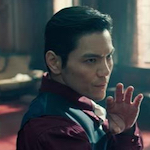 100 YARDS was one of my most anticipated movies this year – it’s the latest period martial arts epic from writer/director Xu Haofeng, this time with his brother Xu Junfeng credited as co-director. Junfeng is a newbie but Haofeng is one of my favorite modern martial art directors, a true auteur with a very distinct style and tone and a set of reoccurring themes that happen to be extremely my shit.
100 YARDS was one of my most anticipated movies this year – it’s the latest period martial arts epic from writer/director Xu Haofeng, this time with his brother Xu Junfeng credited as co-director. Junfeng is a newbie but Haofeng is one of my favorite modern martial art directors, a true auteur with a very distinct style and tone and a set of reoccurring themes that happen to be extremely my shit.
This one is about the Tianjin martial arts scene in 1920, so it’s about what was going on there around a decade before his 2015 film THE FINAL MASTER. At this point there is only one kung fu school, Master Shen’s, but the world is changing and the next generation are trying to establish themselves.
The opening scene, taking place on a snowy morning, is pure, beautiful Xu. Qi Quan (Andy On, TRUE LEGEND, BLACKHAT, ABDUCTION) rushes to the school as if called into town for a family emergency. He asks how the Master (Guo Long) is doing. Not good. He goes inside, the elders of “the circle” are gathered, the Master is lying in bed. He points to the window and his son Shen An (Jacky Heung, FEARLESS) already standing in the snowy courtyard. “Have a duel,” he says. His associate Chairman Meng (Li Yuan, BROTHERHOOD OF BLADES 2) closes the curtain and tells the others, “Have a seat. This is not for us to watch.”
A private duel! Like Rocky and Apollo’s rematch, or Bruce Lee vs. Wong Jack Man. Legendary shit. But we get to watch. We’re out there with them in the cold, hearing every sound of their movements. Just us and them and the Master leaning out the window from his bed, watching intently.
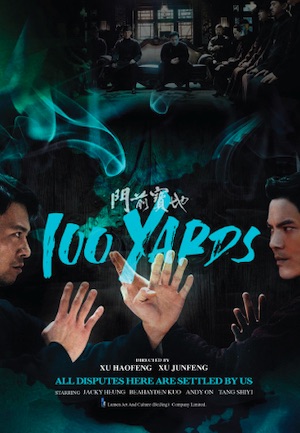 The ostensible purpose is to decide who will inherit leadership of the school, and though the son is very good and improving, the Master pushes the apprentice to go all the way and beat him. I took this, at the time, as the Master wanting his son to lose the school and then truly earn his inheritance by winning it back, but the preponderance of the evidence tells me he really just thought it would be better for the kid to get into the banking industry, where he was able to get him a job using his connections.
The ostensible purpose is to decide who will inherit leadership of the school, and though the son is very good and improving, the Master pushes the apprentice to go all the way and beat him. I took this, at the time, as the Master wanting his son to lose the school and then truly earn his inheritance by winning it back, but the preponderance of the evidence tells me he really just thought it would be better for the kid to get into the banking industry, where he was able to get him a job using his connections.
An feels humiliated by the slight and wants a rematch just to prove himself, but otherwise intends to follow his father’s wishes. Unfortunately he also feels humiliated when the bank president (Mable Vincent) calls him in to fight some other guy’s “highly skilled” bodyguards for the amusement of other rich white people.
At first he refuses, because “Dueling in public is an insult to our predecessors.” This will be a theme throughout. Whenever he wants to fight someone in the streets he’s told that’s for hoodlums. Taking one step out of the school’s boundaries signals you’re ready for hoodlum shit.
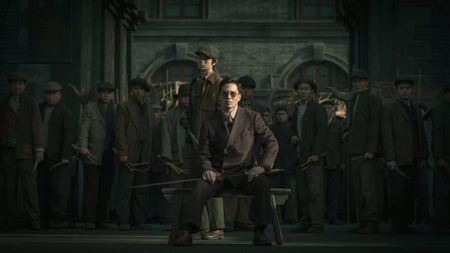 But he gets taunted into this meaningless fight against the bodyguard (Yuri Timg?) and the bank president’s boxer son Kevin (Kevin Lee, WOLF WARRIOR). After taking them both out he quits his job by tossing his tie on the ground. I think Jack Foley did something similar when he quit his humiliating bank job in OUT OF SIGHT, but this has added significance with the tie representing the western values he had tried to acquiesce to. He mostly goes back to eastern dress after that while his rival keeps increasing his suits and sunglasses game.
But he gets taunted into this meaningless fight against the bodyguard (Yuri Timg?) and the bank president’s boxer son Kevin (Kevin Lee, WOLF WARRIOR). After taking them both out he quits his job by tossing his tie on the ground. I think Jack Foley did something similar when he quit his humiliating bank job in OUT OF SIGHT, but this has added significance with the tie representing the western values he had tried to acquiesce to. He mostly goes back to eastern dress after that while his rival keeps increasing his suits and sunglasses game.
Though revelations about his father cause An to question the usefulness of martial arts, Chairman Meng insists that they’ll keep the peace. If everyone starts getting guns the conflicts will be bigger and deadlier, so instead the circle trains people, arranges fights and makes sure disputes are settled through fair duels. She worries that Quan endangers this by training “hoodlums from the piers.” He paints it as an idealistic modernization, bringing working class people into their world, but I think it turns out to be more like a gangster method of gaining loyalists. Either way, Chairman Meng doesn’t like it and gets An a rematch for the right to take over the school. Then she gets (spoiler) shot dead in the street, so the next duel is about whether Quan is to blame.
Despite the masculine title, short hair and men’s suit, Chairman Meng is a woman. At the end of the movie another woman takes on her role and style of dress, and one of the great characters in Xu’s THE FINAL MASTER was similar. I’m curious whether this really was the fashion for powerful women in early 20th century China, or whether it’s just a character type Xu enjoys. I have no idea. I like it, though.
My favorite of Xu’s obsessions is the secret kung fu move or style passed down from a Master through trusted family members and students – knowledge that must be kept alive but also secret. Master Shen taught three fist fight forms, but both An and Quan suspect that there’s a secret fourth form that’s been kept from them. Quan thinks it might be connected to old rumors of a short saber technique taught to the Master by a female bandit. He gets so obsessed he kidnaps Gui Ying (newcomer Shiyi Tang), a Shen family friend who might know about it. By the way, An hasn’t seen Gui Ying in years but he just left his girlfriend (Bea Hayden Kuo, ALMOST HUMAN) for her – long story that’s about to get even more confusing.
While fighting Gui Ying (one of the best scenes – her strange movements and fighting style are beautiful to behold) Quan spots the short saber technique, so he’s convinced the Master taught it to her as sort of a “break glass in case of emergency” contingency. If he goes crazy she’ll teach it to An and he’ll use it to defeat him and take the school back. He’s got it at least partially wrong, but it’s the kind of cool idea Xu’s movies are overflowing with.
I was excited to see this in a theater, but it’s not playing here, so I just rented it from Apple TV. That turned out to be better, I think, because I did lots of rewinding to try to make sure I was taking in everything everyone was saying and keeping up with it all. Xu’s movies tend to get convoluted and hard to entirely follow, and this one is so much about people not being what they seem or what others assume they are that it’s hard to keep track of what they actually are. I wanted to rewatch part of it again the next day and ended up watching the whole thing, feeling like this time I got most of it. So these movies can be a bit challenging, at least for me, but they’re worth the effort – I jumped from wanting to love it to actually loving it within about 12 hours.
As in most of my favorite martial arts movies there are little lessons and pieces of wisdom you can find in it. One is in the arc of the guy who leads the gang of slingshot bandits. He becomes very loyal to Quan for getting him a job, but then An spares him from punishment for something he did. The relationship with Quan was transactional, the one with An was genuine, so when it comes down to it, who do you think he sides with?
And note what guns bring to the story. A few people have them for defense or hunting. Only two shots are fired in the movie, both times fatal and both times nobody even sees who did it. Guns just get people killed, it’s a fact. Kung fu is better.
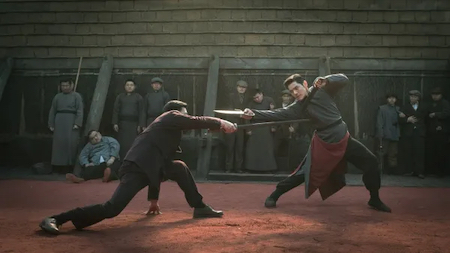 Whatever you get out of the story and themes – which I know some will find less interesting than I did – you will have no choice but to admire Xu’s always incredible fights. Sharing martial arts director credit with Duncan Leung (whose IMDb page only lists producing a short, being Wing Chun consultant on THE GRANDMASTER, and playing “Master” in DEVIL’S EXPRESS), Xu once again finds a wide variety of novel weapons including curved wooden clubs, an unsharpened sword, blades with ropes tied around them for safety, then untied when shit gets serious. And as always there’s a particular attention paid to the sounds of the fights – the ping of vibrating wood, the scraping of blades, the clothing shifting. During the fights at the bank they’re wearing dress shoes on a wooden floor and it sounds like basketball sneakers in a gym. I question whether that’s what it would really sound like, but it adds so much intensity to their movements.
Whatever you get out of the story and themes – which I know some will find less interesting than I did – you will have no choice but to admire Xu’s always incredible fights. Sharing martial arts director credit with Duncan Leung (whose IMDb page only lists producing a short, being Wing Chun consultant on THE GRANDMASTER, and playing “Master” in DEVIL’S EXPRESS), Xu once again finds a wide variety of novel weapons including curved wooden clubs, an unsharpened sword, blades with ropes tied around them for safety, then untied when shit gets serious. And as always there’s a particular attention paid to the sounds of the fights – the ping of vibrating wood, the scraping of blades, the clothing shifting. During the fights at the bank they’re wearing dress shoes on a wooden floor and it sounds like basketball sneakers in a gym. I question whether that’s what it would really sound like, but it adds so much intensity to their movements.
This also has another unusual score by Xu’s regular composer An Wei, throwing some spaghetti western sounds and bluesy trumpet and harmonica. Xu’s movies always carry a unique style and personality even as they keep getting bigger and more meticulous. This is a huge production with beautiful sets and costumes and huge scenes with numerous extras, often fighting. Before long he will have staged a fight with every type of weapon ever used in the history of China (and probly some made up ones). In some ways I miss the relative simplicity of his first few movies, but also it’s incredible to see him take things even further than he did in THE FINAL MASTER.
He comes first from a martial artist background, then from a novelist background. His plots can arguably get too elaborate, but to me they’re always fascinating. When An gives Quan an official challenge letter to settle the murder of Chairman Meng, Quan says, “Your actions are unreasonable, but I’m captivated. I accept.” That’s how I feel about martial arts movies. If I understand where the characters are coming from, but also it seems pretty unhinged for them to be having a sword duel over this shit, that’s the best. Xu Haofeng’s movies are some of the most captivating I know of.
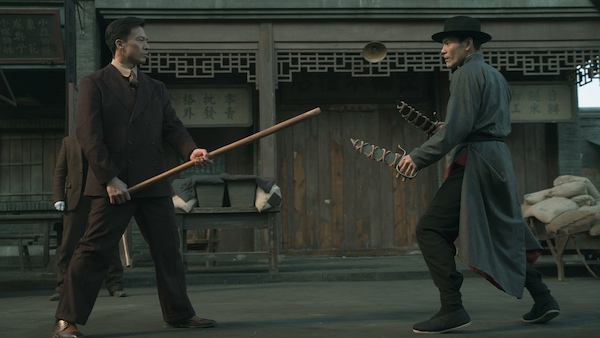
Other Xu Haofeng movies I’ve reviewed:
THE SWORD IDENTITY (2011)
JUDGE ARCHER (2012)
THE FINAL MASTER (2015)
also:
Wong Kar Wai’s THE GRANDMASTER (which he co-wrote)
Chen Kaige’s MONK COMES DOWN THE MOUNTAIN (which is based on one of his books)


























November 11th, 2024 at 7:30 am
I am not familiar with Xu’s worked but loved this one. It’s interesting to hear he worked on THE GRANDMASTER because 100 YARDS felt very similar in a number of ways and reminded me of it.